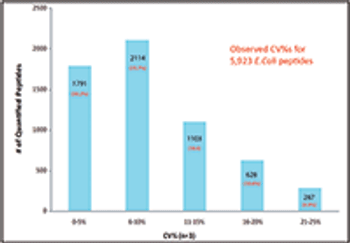
A look at how data integrity requirements and the focus of data integrity have changed over the past five years.

A look at how data integrity requirements and the focus of data integrity have changed over the past five years.

Can we see the wood for the trees?

A snapshot of key trends and developments in the chromatography sector according to selected panellists from companies who exhibited at Analytica 2018.

We have entered a new stage in the era of accelerations. Moore’s law continues its expansion, increasing exponentially the computer power available. Other accelerations are remarkable, particularly easy access to cloud computing and the expansion and influence of artificial intelligence to practically all sectors of our society.

A one-day symposium, organized by The Chromatographic Society, discussing practical advances in automation and data processing in modern science laboratories was held at Syngenta Research Laboratories in Bracknell, Berkshire, UK, on 25 October 2016.

This article describes the development of a new data-independent acquisition (DIA) workflow for protein quantification that uses a mass spectrometer that combines three types of mass analyzers to achieve lower limits of detection (LOD), higher sensitivity, more accurate quantitative results, wider dynamic range, and better reproducibility than existing high-resolution accurate-mass (HRAM) tandem mass spectrometry (MS-MS) DIA workflows.

Chromatographers rely on software for many laboratory functions, including method development, instrument control, data acquisition and analysis, and data archival. Participants in this Tech Forum are Tony Owen of Agilent Technologies, Damien Rosser of ALMSCO International, David Chiang of Sage-N Research, and Mark Harnois of Waters Corporation.

An overview of current chromatography-based food toxicant screening is presented.

The author examines the process of validating a CDS and describes the trials along the way such as speed of validation, risk management, and so forth.


Software traditionally used to control and process data in analytical instruments is now being expanded to include functions such as automated system monitoring with maintenance feedback alerts and interactive diagnostic routines that enable users to quickly track and resolve the source of many system problems. As a back up to these functions, a second layer of expert support is being made available by some instrument vendors to address more complex servicing issues. For larger or more elaborate instrument installations, monitoring and diagnostic software functions can be integrated with remote servicing expertise in a networked configuration to provide continuous proactive instrument maintenance. The benefits of these innovations include lower and more predictable operating costs, reduced system downtime, and more efficient utilization of the instrument user's time.

In the second of a two-part series, Marlin K.L. Bicking continues to explain his work concerning integration errors in peaks with approximately equal sizes (small peak ratios).


This column discusses potential sources and ways to avoid out-of-specification (OOS) results and highlights the draft FDA guidelines on OOS investigations.

The November 2001 installment addressed requirements and potential problems associated with the acquisition of fast chromatography peaks at detectors and data-recording systems. Hinshaw continues the topic in this month's column and treats issues that involve qualitative data reduction after a chromatogram has been acquired.

Column Editor Kevin Altria explores new websites and shares information about the features of these sites.

By calculating optimal stationary-phase composition and physical parameters, column developers can construct columns that provide the exact separation requirements desired by analysis or current methods.

This "Data File" column shows readers how to incorporate e-mail in chromatography data systems and suggests how other Internet technologies can improve modern laboratory practices.

The first two parts of this series covered the fundamentals of a system and the specification, evaluation, and selection of a chromatography data system. Part III discusses the validation work in parallel with progress through the life cycle of the project.

The last "Data File" column discussed three of the six main parts found in a desktop database management system. In this installment, Glenn Ouchi introduces the other three parts: reports, macros, and modules.

Column editor McDowall discusses electronic records and signatures and the effects of legislation regarding their use within the pharmaceutical industry.

In the second installment of this series, the author looks at the first phase of the life cycle of a new chromatography system, bringing together a number of elements of the workflow and the functions as they are used in the laboratory.

Part I of this series of articles provides an overview of a chromatography data system, including the life cycle, key functions, and problems.

Ouchi explains why getting to know the features of a desk-top database management system is the best way to learn the basics of database management.

Data management using database management system software has become a mainstream desktop application because of its ease compared with spreadsheet programs.